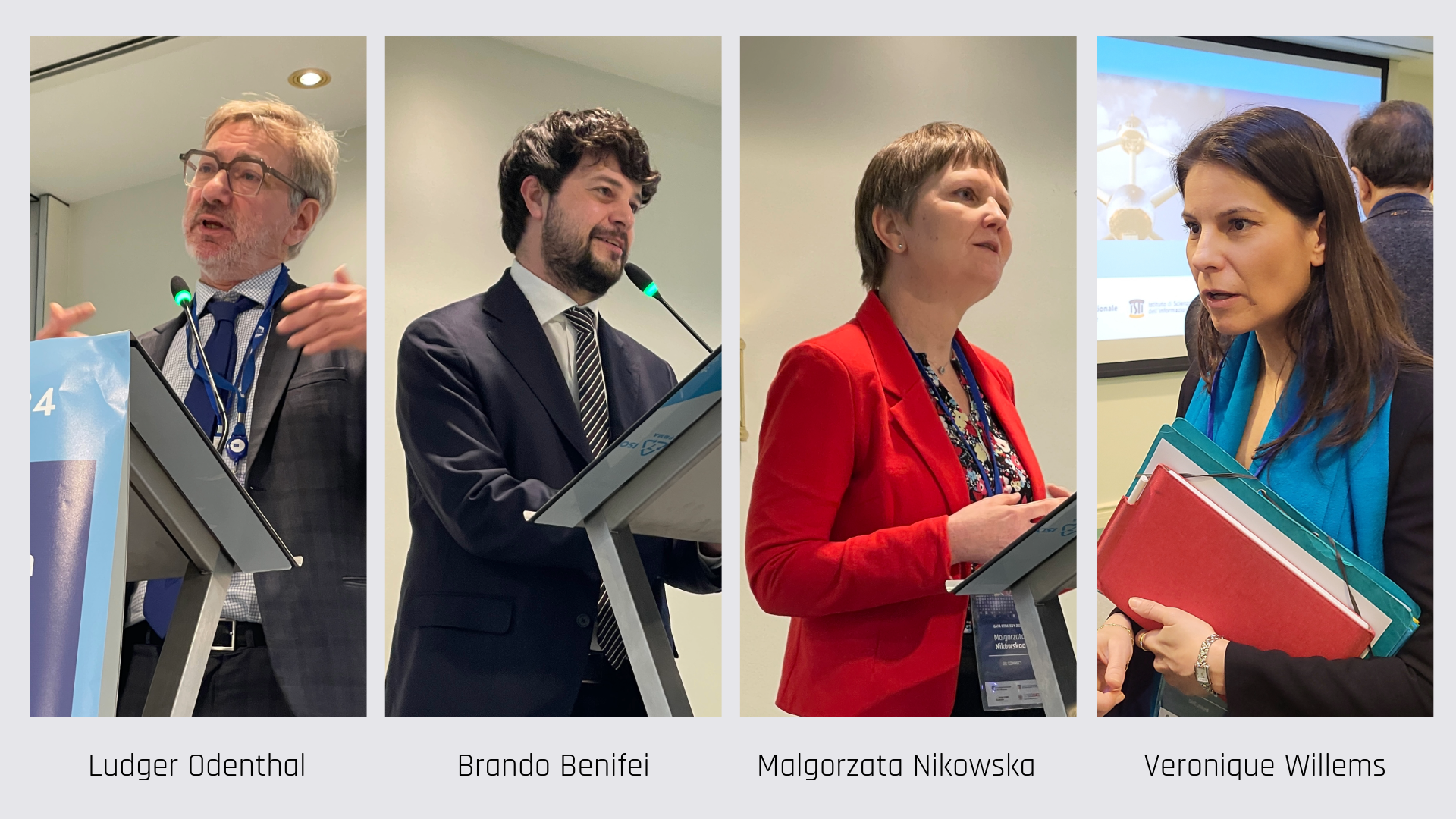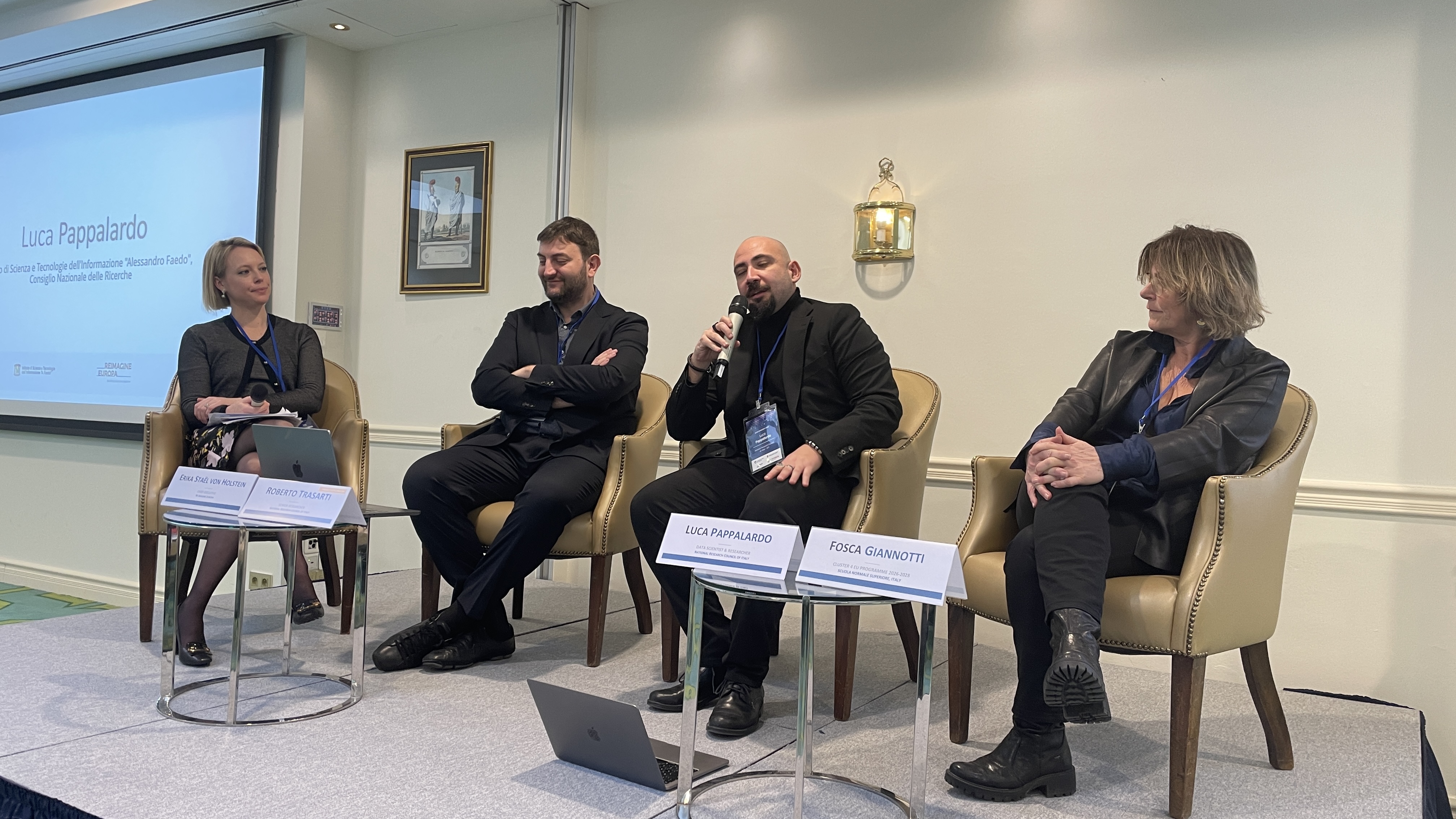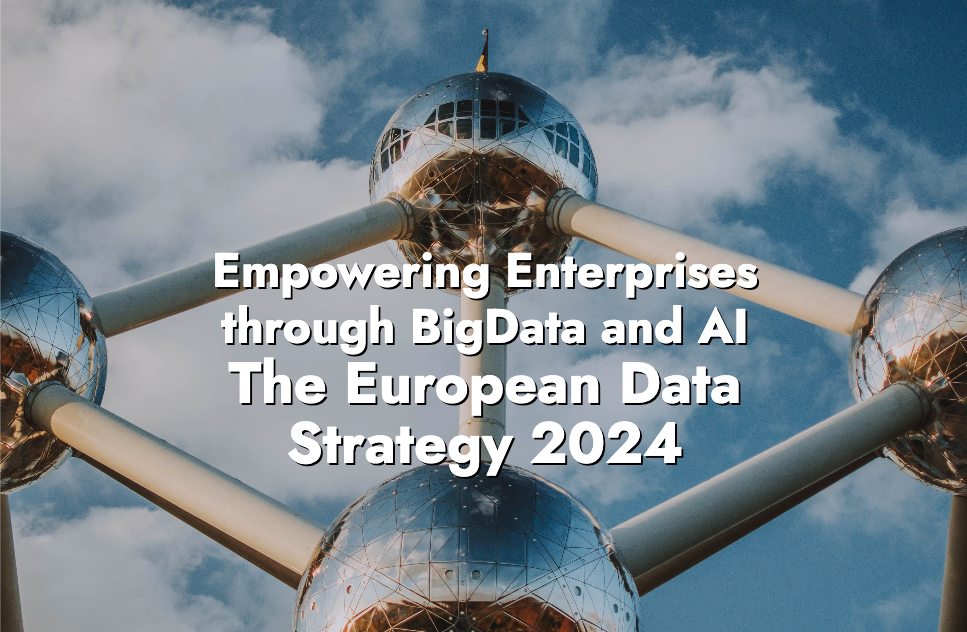Data Strategy 2024 Conference
SoBigData event, Empowering Enterprises through BigData and AI - The European Data Strategy 2024, organised by the Consiglio Nazionale delle Ricerche - Institute of Information Science and Technologies, in cooperation with Re-Imagine Europa, took place on the morning of Tuesday 13th February, in Brussels.
European SMEs at the event highlighted their needs, concerns, and priorities, emphasizing their role in keeping Europe competitive in the Digital Age, aligned with the goals of the European Data Strategy.

Speeches:
Brando Benifei - Italian MEP and AI Act Rapporteur - the welcome speech given by Brando Benifei was to provide the representatives of various business and healthcare associations, non-profit organisations and research infrastructures with a comprehensive understanding of where Europe currently stands in its transition to a digital society and how members of these industries can be supported in the process of digitisation.
Malgorzata Nikowska – Head of Digital Transformation of Industries, DG CONNECT - highlighted how digitalisation has become an important priority for the European Commission (EC), marked by the introduction of their ‘Digital Decade’ policy programme, setting targets and objectives for 2030 to guide Europe’s digital transformation. This has included the development of their ‘Digital Compass’, which is focused on enhancing digital skills, infrastructure, business, and government. With the digitalisation of business, the hope is to have 90% of SMEs achieve at least a basic level of digitalisation, and 70% of all companies using advanced technologies by 2030. To achieve this, the EC has set up a cooperation mechanism between member states, allowing them to set, implement, and track their own digital goals. Dr Nikowaska stressed that there is still a long way to go to achieve a more innovative Europe, one that is ‘fit for the digital age’. For example, currently, there are only 9 million ICT specialists across the EU, hoping to increase this to 20 million by the end of 2030. This would translate to around 90% of SMEs in Europe having digital capabilities. She admitted that only 23% currently have a basic level of digital capacity. Nevertheless, she noted optimistically that strong foundations have been laid in the emerging data field, leading her to call for creating a single data market in the EU. She emphasised that in order to do so, we must train our AI models to reduce energy dependency and become more resource-efficient.
Ludger Odenthal - Head of SME Performance Review, DG GROW - outlined two major streams of activity. The first is to get cutting-edge firms to start up in Europe, while the second is to get the 25 million businesses that already exist to digitalise. He noted that the yardstick of our success is thus the extent to which we can get them all to digitalise. The SME performance review is one of the European Commission's main tools to monitor and assess countries' progress in implementing the SME strategy and the Small Business Act (SBA). Their annual report provides a synopsis of SMEs' size, structure, and importance to the European economy, as well as an overview of SMEs' past and forecasted performance.
Veronique Willems – Secretary General, SME United - highlighted how SMEs in Europe account for 99.8% of all enterprises, 2/3 of employment, and 53% of the added value created in the European Union. These enterprises play a decisive role in Europe’s economy and society, are drivers of innovation, and ensure social and regional stability. However, 93% of European crafts and small businesses have less than 10 employees, with the average number being just 4. In the last 10-20 years, there has been a lot of development in the digitalisation of the business industry, accelerated in particular by the COVID-19 pandemic, though since this, progress has plateaued somewhat. There are, Ms Willems suggested, just three main ‘players’ in the digitalisation of business: those who we would consider to be leading the transitions, those who follow, and those who lag behind. Ms. Willems helped to shed light on the pivotal role SMEs play in Europe's economy and society, representing the backbone of innovation and ensuring social and regional stability. Despite their significance, many SMEs continue to face challenges in embracing digitalisation. To address these challenges, concerted efforts are needed to provide digital training, enhance cybersecurity measures, clearer legislation, and improve infrastructure, with initiatives like the Data Act and Digital Innovation Hubs playing crucial roles. By addressing these challenges and supporting SMEs in their digital transformation journey, Europe can unlock the full potential of its small and medium-sized enterprises, driving economic growth and prosperity.
Luca Pappalardo - Data Scientist at CNR ISTI - began his talk by examining the importance of public research. He posited that this is a key component behind the success of technological giants such as Facebook and catalysing the growth of Google (formally Page Rank) and Spotify (formally Echo Nest), for example. He then questioned how we could recreate such fertile environments in order to foster similarly groundbreaking ideas in Europe, remarking that fledgling innovations can often face roadblocks due to a lack of expertise or physical infrastructure. He noted that the solution may lie in comprehensive research infrastructure. Thankfully, there are a wide number of research infrastructures in Europe, and though each has slightly different policies, there are a number of shared underlying principles. These include project proposal mechanisms and technical resources, where proposals are evaluated based on merit and eligibility. If they are accepted, then access to the research infrastructure will be granted. Composed of over 30 universities, research infrastructures such as SoBigData provide primarily technical (e.g., data), computational, and human resources, as well as the necessary legal support that allows researchers to develop their ideas.
 Round table: Erika Staël von Holstein, Roberto Trasarti, Luca Pappalardo, Fosca Giannotti
Round table: Erika Staël von Holstein, Roberto Trasarti, Luca Pappalardo, Fosca Giannotti
Reflecting on the collaborative efforts showcased during the conference, it is evident that Europe is poised to embrace a digitally advanced future. The presentation by Malgorzata Nikowska underscored the European Commission's commitment to driving digital transformation, particularly among SMEs, and highlighted the pivotal role these enterprises play in Europe's economy and society. In addition to the opportunities, it is also crucial to delve deeper into the challenges faced by SMEs and research infrastructures in navigating the complexities of digitalisation. As Ludger Odenthal and Veronique Willems noted, one significant challenge is the disparity in digital skills and resources among SMEs, with many lacking the expertise and infrastructure needed to leverage big data and AI technologies effectively. Addressing this challenge requires comprehensive initiatives aimed at providing accessible and tailored digital training programs, fostering collaboration between SMEs and research institutions, and enhancing digital literacy among entrepreneurs and employees.
Moreover, as reported by Roberto Trasarti (CNR ISTI - SoBigData RI coordinator) and Fosca Giannotti (Scuola Normale Superiore), concerns surrounding data privacy, security, and ethical implications remain prominent barriers to the widespread use of Big Data in the digitisation process. As businesses increasingly rely on data-driven decision-making processes, ensuring robust data governance frameworks and regulatory compliance becomes paramount. This entails developing transparent and accountable data management practices, implementing stringent cybersecurity measures, and adhering to ethical guidelines to safeguard individuals' privacy rights and mitigate potential risks associated with AI algorithms.

